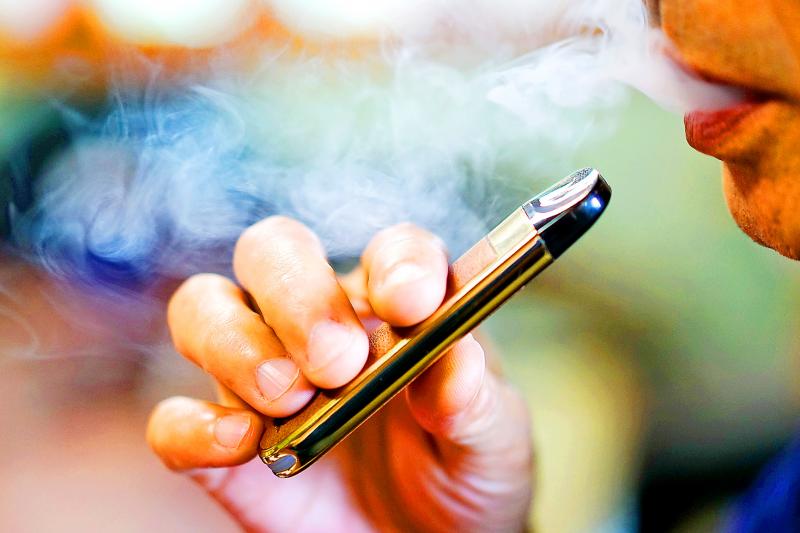The Taipei City Government on Wednesday became the nation’s first local government to pass a jurisdiction-wide ban on e-cigarettes via a self-government ordinance.
If the Executive Yuan ratifies the measure, the city would impose a broad-ranging prohibition on the sale, advertisement, display and commercial transportation of novel tobacco products, including vaping devices and heated tobacco units.
Additionally, vaping and using heated tobacco products is to be banned in a 50m zone around schools.

Photo: Lin Ching-lun, Taipei Times
Businesses that breach the proposed regulation are to be fined NT$2,000 to NT$10,000, while those who use novel tobacco devices in a prohibited zone are to face the same fines and attend an anti-tobacco program.
The city ordinance, which initially targeted only vaping devices, was expanded to include heated tobacco products at the suggestion of Taipei City Councilor Wang Hong-wei (王鴻薇) of the Chinese Nationalist Party (KMT).
Health Promotion Division Director Lin Meng-hui (林夢蕙) lauded the council’s decision, but said the city has not drafted a timetable for implementing the ban.
The tobacco industry has promoted novel tobacco products as a means to reduce harm from second-hand smoke and as a smoking cessation aid, but these claims are false, she said.
Lin said government testing showed that more than 80 percent of e-cigarettes contain nicotine, and that the devices create dependence on the substance.
E-cigarette use has been linked to higher risks of cancer, cardiovascular and lung diseases, and congenital birth defects in infants, she said, adding that the public wants their use regulated.

The manufacture of the remaining 28 M1A2T Abrams tanks Taiwan purchased from the US has recently been completed, and they are expected to be delivered within the next one to two months, a source said yesterday. The Ministry of National Defense is arranging cargo ships to transport the tanks to Taiwan as soon as possible, said the source, who is familiar with the matter. The estimated arrival time ranges from late this month to early next month, the source said. The 28 Abrams tanks make up the third and final batch of a total of 108 tanks, valued at about NT$40.5 billion

Two Taiwanese prosecutors were questioned by Chinese security personnel at their hotel during a trip to China’s Henan Province this month, the Mainland Affairs Council (MAC) said yesterday. The officers had personal information on the prosecutors, including “when they were assigned to their posts, their work locations and job titles,” MAC Deputy Minister and spokesman Liang Wen-chieh (梁文傑) said. On top of asking about their agencies and positions, the officers also questioned the prosecutors about the Cross-Strait Joint Crime-Fighting and Judicial Mutual Assistance Agreement, a pact that serves as the framework for Taiwan-China cooperation on combating crime and providing judicial assistance, Liang

A group from the Taiwanese Designers in Australia association yesterday represented Taiwan at the Midsumma Pride March in Melbourne. The march, held in the St. Kilda suburb, is the city’s largest LGBTQIA+ parade and the flagship event of the annual Midsumma Festival. It attracted more than 45,000 spectators who supported the 400 groups and 10,000 marchers that participated this year, the association said. Taiwanese Designers said they organized a team to march for Taiwan this year, joining politicians, government agencies, professionals and community organizations in showing support for LGBTQIA+ people and diverse communities. As the first country in Asia to legalize same-sex

MOTIVES QUESTIONED The PLA considers Xi’s policies toward Taiwan to be driven by personal considerations rather than military assessment, the Epoch Times reports Chinese President Xi Jinping’s (習近平) latest purge of the Chinese People’s Liberation Army (PLA) leadership might have been prompted by the military’s opposition to plans of invading Taiwan, the Epoch Times said. The Chinese military opposes waging war against Taiwan by a large consensus, putting it at odds with Xi’s vision, the Falun Gong-affiliated daily said in a report on Thursday, citing anonymous sources with insight into the PLA’s inner workings. The opposition is not the opinion of a few generals, but a widely shared view among the PLA cadre, the Epoch Times cited them as saying. “Chinese forces know full well that